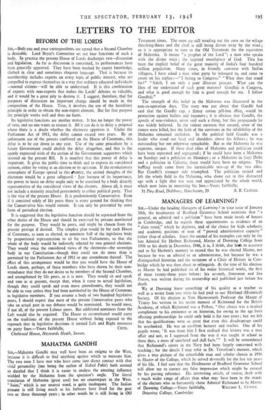MANAGERS OF LEARNING?
SIR,—Under the heading Managers of Learning ? in your issue of January 30th, the headmaster of Bradford Grammar School mentions that "a general, an admiral and a politician" have been made heads of houses in Cambridge, and he regards these appointments as evidence of an "alien trend," which he deplores, and of the choice for high scholastic and academic positions of men of "proved administrative capacity" rather than of scholars. Since the second of his examples can only be the late Admiral Sir Herbert Richmond, Master of Downing College from 1936 to his death in December, 1946, it is, I think, due bosh to accuracy and to Sir Herbert's memory to record that he was elected Master, not because he was an admiral or an administrator, but because he was a distinguished historian and the occupant of a Chair of History in Cam- bridge which he was then about to relinquish. At the time of his election as Master he had published six of his major historical works, the first of them twenty-three years before: his seventh, Statesmen and Sea Power, was written during his mastership and published just before his death.
We at Downing knew something of his quality as a teacher as well as a writer from two visits he had paid to our Maitland (Historical) Society. Of his election as Vete Harmsworth Professor the Master of Trinity has written in his recent memoir of Richmond for the British Academy, of which Richmond was a Fellow, "Our choice was a marked compliment to his eminence as an historian, for owing to the age limit affecting professorships he could only hold it for two years ; but we felt that his qualifications were so great that even this disadvantage could be overlooked. He was an excellent lecturer and teacher. One of his pupils wrote, 'It was from him I first realised that history was a true affair and not, as I supposed from the way it was taught at school in those days, a mass of unrelated and dull facts.'" It will be remembered that Richmond's career in the Navy had been largely concerned with teaching ; for the details I may refer to Dr. Trevelyan's memoir, which gives a true picture of the remarkable man and scholar chosen in 1936 as Master of the College, which he served devotedly for the last ten years of his life. I feel sure that the Headmaster of Bradford Grammar School will allow me to correct any false impression which might be created by his passing reference. His interesting article, of course, dealt with a much wider range of affairs than what may have been in the minds of the electors who so fortunately chose Admiral Richmond to be Master of Downing College.—Yours faithfully, WILLIAM L. CUTTLE. Downing College, Cambridge.


































 Previous page
Previous page